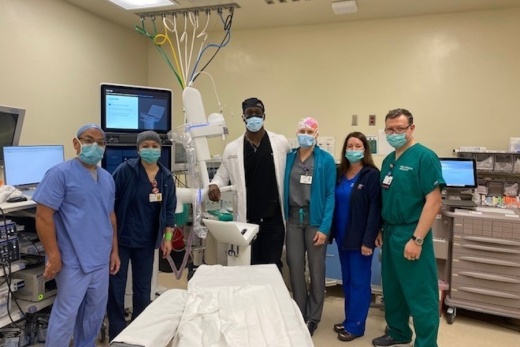Doctors in neurology, pathology and pulmonary health are likely to see the greatest benefit, said Jim Brown, CEO of HCA Houston Healthcare North Cypress.
Other AI tools can evaluate specimens for cellular abnormalities for pathologists, Brown said.
“I'm seeing advances as I evaluate new technology and work with our physicians to layer in new diagnostic tools, and hear presentations from vendors that AI is going to play a major role,” Brown said.
These advances can be achieved by investing in newly developed software that can run on existing devices that hospitals already have, Brown said.
Dr. Michelle Scerbo, general and bariatric surgeon at Memorial Hermann Cypress Hospital, said she spent a year in a fellowship program learning how to use the robotic surgical tools.
“I would say the beginning of my training in robotics was at the forefront of its development, and now it's more of a part of our daily life in medicine. And the technology has developed substantially so that it's much easier to access and use compared to 15 years ago,” Scerbo said.
Memorial Hermann officials said artificial intelligence is used in the following processes and procedures, among others:
- Processing and summarizing providers’ discussions with patients for more concise documentation
- Extracting certain medical diagnoses and prompting suggestions for ordering diagnostic tests
- Live video recognition to identify certain tissue abnormalities
- Organizing surgical procedures and analyzing operating room efficiency
In 2023, more colon surgeries were performed using robotics than traditional methods for the first time in U.S. history, said Dr. Diego Marinas, a colorectal surgeon with Houston Methodist Willowbrook Hospital.
Marinas performs both traditional and robotic surgery but said over the last decade, robotic surgery has become more widespread, primarily because of the quick recovery time.
Marinas said robotic-assisted surgery has been widely adopted, including in the following types of surgeries:
- Hernia
- Gallbladder
- Hysterectomy
- Prostatectomy
- Lung
- Esophageal
“It’s not just a robot that you can control. It ... gives you data about each of the moves you make, and how to be efficient [and] less traumatic to the tissues. So the overall results are just incredible if you use it well,” Marinas said.





